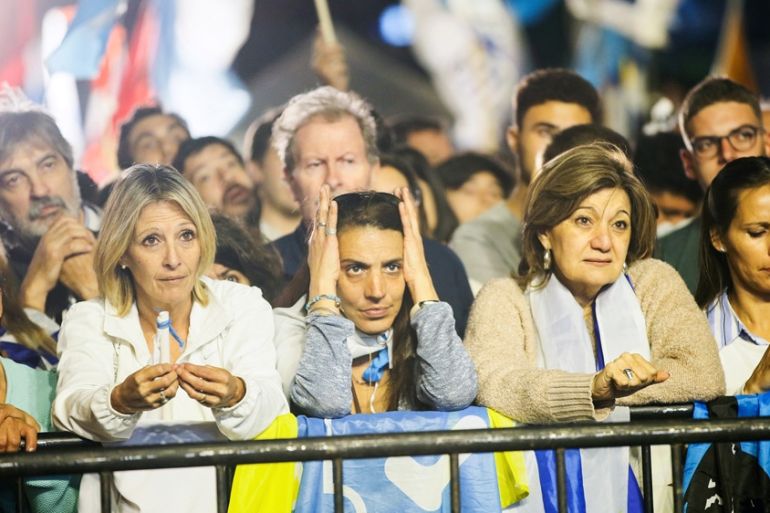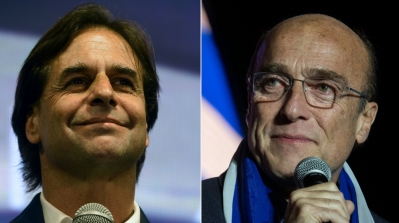Uruguay awaits final poll result after runoff too close to call
Number of ‘observed’ ballots exceeds the margin between the two candidates in presidential runoff.

Uruguay is set to begin counting key votes that could decide the country’s next president after the results of an election runoff were deemed too close to call.
The country’s electoral court said on Sunday that the margin between the two candidates was so narrow it could not declare a winner until a count of the “observed” votes – votes cast by people who could not make it to their assigned polling station – was completed.
Keep reading
list of 3 itemsRuling left coalition faces tough presidential runoff in Uruguay
Is boom, then slump, behind fiery Latin American protests?
The counting of these ballots, which number about 35,000, would begin on Tuesday, the court said, adding that a final result would be announced on Thursday or Friday.
Voting is mandatory in Uruguay for citizens over the age of 18 and a special condition known as “observed voting” exists to allow polling station employees and others involved in running the vote to cast their ballots, as well as those who may not be able to reach their assigned polling station for reasons such as disability.
These votes are valid but are not included in the first count and usually do not have the power to sway a result.
However, with 100 percent of non-observed votes counted, Luis Lacalle Pou, the conservative candidate of a coalition spearheaded by the National Party, led with 48.71 percent of the vote, according to official data.
Daniel Martinez’s leftist ruling Broad Front party came in at 47.51 percent, with the two rivals separated by 28,666 votes.
The close count means Martinez would need to win 90.69 percent of the “observed” votes to become Uruguay’s next president, beating Lacalle Pou by a single vote assuming none of the observed votes were void or blank.
The electoral authority said more than 70 percent of the country’s 2.6 million eligible voters had cast ballots three hours before the polls were due to close at 22:30 GMT.
‘Irreversible’ result
Addressing supporters late on Sunday, Lacalle Pou said he would wait to claim victory and that the close result meant the two parties would need to work closely together in the period ahead.
“Formally, we will know in a few days,” he told a crowd of thousands of people gathered outside the National Party headquarters, adding that he believed the result was “irreversible”.
“Everybody knows it and they don’t accept it,” Lacalle Pou said.

Pre-election polls had made Lacalle Pou, 46, whose father is a former president, favourite to topple the long-standing coalition that has been led by President Tabare Vazquez since 2015.
A swing to the right would mark a major shift in the country – over the past 15 years, Broad Front has overseen a period of stability and growth during which Uruguay approved abortion, same-sex marriage and pioneered the legalisation of cannabis.
However, the party has come under pressure recently from a slowing economy due to global trade woes and the effects of drought and flooding on the key farming sector.
In a region erupting with political unrest, Uruguay has remained stable. However economic growth slowed to just 0.1 percent in the second quarter of the year.
Unemployment has also edged up to 9.2 percent versus a year earlier, while inflation this year so far has been 8.36 percent.
Public safety has also been eroding, with a sharp rise in some violent crimes reported last year, including a record 414 murders, up 45 percent on the year before.
In a highly unusual incident in the early hours of Sunday, a bus carrying military personnel to guard ballot boxes was stoned by people participating in an electronic music festival in the capital, Montevideo.
Local media and videos circulating on Twitter showed that several cars had been damaged.
“When I saw that this morning, I thought it was another country. Unfortunately it was Uruguay,” said Lacalle Pou, who has promised to get tough on rising crime levels.